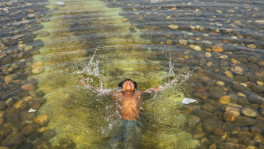63% of poor coastal families took high-interest loans during shutdown: Survey
The survey also found that 57 percent of households were in food crisis, and about 46 percent had experienced increased violence against women

A recent survey conducted by a non-governmental organisation has found that about 63 percent of poor coastal households have borrowed money at high-interest rates from local moneylenders during shutdown due to lack of institutional credit facilities.
The survey also found that 57 percent of households were in food crisis because of the shutdown, and about 46 percent had experienced increased violence against women.
The Monitoring and Research Department of the Coast Trust, a Bangladeshi non-governmental organisation, conducted the survey, read a press release on Tuesday.
Coast surveyed eight coastal districts to know the Covid-19 shutdown impact on the livelihoods of poor people.
Rezaul Karim Chowdhury, executive director of Coast, said that a local moneylender had killed a poor man recently in Kutubdia of Cox's Bazar for failing to repay loan.
"We conducted this survey to understand the plight of the low-income people caused by the shutdown," he said.
The survey collected data from 240 poor, women-led, and low-income families under 12 branches of the organisation in six districts, including Chattogram, Noakhali, and Barishal, from the last week of April to the first week of May. 83 percent of the respondents live in villages and 17 percent in cities. 57.3 percent of the respondents are from women-headed families.
According to the survey, 42 percent of the families can continue their meals three times a day, which is normal. 52 percent are eating twice a day and five percent are having only one meal per day.
Also, 56 percent of the families used to eat regular protein i.e. fish, meat, or eggs 3-4 days a week, which came down to 13 percent because of the shutdown. 87 percent of the households now consume such protein 1-2 days a week.
Because of the shutdown, 34 percent of the households have lost their income completely. Income has decreased by one-fourth for 39 percent of the families, and half for 19 percent.
As for women-headed families, 46 percent have lost their income completely while income has dropped to one-fourth for 30 percent.
Eighteen percent of the households have borrowed from relatives and 13 percent have received no loan. 48 percent of households have broken their savings in response to the crisis caused by the shutdown.
Thirty-five percent of the families sold their cows and goats. Among women-headed households, 30 percent of the respondents said there was no way to live off their savings, sell cows or goats or jewellery.
Fifty-four percent of the respondents said that the shutdown gad increased the incidence of violence against women in their families. In 82 percent of the households, abusive language was used. Nine percent of households have been pressured for dowry.
When asked what they plan to do if the shutdown continues, 78 percent of the households said they might need to take loan from a non-governmental organisation or a bank. Otherwise, they will borrow from a local moneylender at a high-interest rate.
Besides, 38 percent of the households said they would live off their savings. 20 percent will sell cows, goats or jewellery. 15 percent will sell labour in advance to local moneylenders, while in women-headed households, the rate is 18 percent.
Ninety-four percent of the households have sought various types of loan support from non-governmental organisations, which were closed during data collection. 41 percent asked for a new loan, 13 percent asked for an increase in ongoing loan amount and 43 percent asked for a cooperative loan or financial support. It is to be noted that most of the borrowers said they will invest for their livelihood.
Sixty-nine percent of the families sought relief from the government and 21 percent sought cash support.
The Coast Trust said low-income people facing food crisis wanted to invest in small businesses to turn their life around, and that is why they needed a loan.
In the absence of micro-credit or other institutional credit arrangements, they will have to borrow from local moneylenders at high-interest rates or will be more at risk of living off their savings, it added.


 Keep updated, follow The Business Standard's Google news channel
Keep updated, follow The Business Standard's Google news channel















